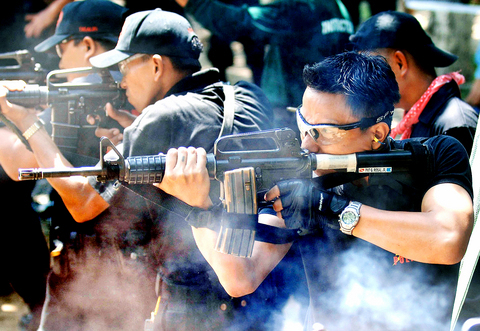The Philippine military yesterday stepped up security in key urban centers in the troubled south after two separate bomb explosions injured four people, while in the north soldiers clashed with communist rebels, killing two.
Major General Agustin Dema-ala said the Abu Sayyaf rebel group and the Jemaah Islamiyah (JI) were the main suspects in the separate bomb attacks in the cities of Cotabato and Koronadal on Saturday.
"Based on previous experience, the Abu Sayyaf and the JI are the groups capable of launching such attacks," he said, adding that the bombings could have been a "diversionary tactic to ease the pressure" from unrelenting military offensives.

PHOTO: AFP
"We have beefed up our security," he added, noting that intelligence information indicated that the Abu Sayyaf and the JI were plotting to "launch a series of attacks" in key cities in the southern region of Mindanao.
Four hours apart
The first attack hit the compound of the Autonomous Region in Muslim Mindanao in Cotabato City, where the homemade bomb explosion injured a 13-year-old girl, officials said.
Four hours later, an improvised bomb ripped through a public market in Koronadal City, injuring three people. The explosive device was planted in a tricycle parked at the entrance of the public market.
Lieutenant Colonel Franklin Del Prado, an army division spokesman, said troops would continue to hunt down Abu Sayyaf rebels and JI militants believed to be hiding in nearby towns and villages of Maguindanao Province despite the bomb attacks.
Del Prado said recent information indicated that Abu Sayyaf chieftain Khadafi Janjalani, and senior leaders Isnilon Hapilon and Abu Solaiman were trapped in Maguindanao.
"We are not certain right now if there are foreigners with them," he said. "They are trapped in the border of Talayan and Guindulungan towns. Our operation will continue without let-up."
Janjalani, Hapilon and Solaiman are wanted by the US, which has offered up to US$5 million in cash rewards for their arrest or prosecution.
Communist rebels
Meanwhile, in the northern part of the country, army troops clashed with communist guerrillas early yesterday in a brief but fierce gunbattle that left two rebels dead and a soldier wounded, the military said.
An army reconnaissance team engaged about 15 New People's Army fighters near Santa Lucia town in northern Ilocos Sur Province, killing two rebels and seizing their assault rifles, according to a military report.
An army corporal was wounded in the clash about 290km north of Manila, the military said. The rest of the guerrillas withdrew into the nearby hinterlands and were being pursued, it added.
The rebels have suspended talks with President Gloria Macapagal Arroyo's government on ending the 36-year-old Marxist insurgency. They have vowed to intensify attacks in an effort to help oust Arroyo, who is facing impeachment over vote-rigging allegations and charges that her family received illegal gambling payoffs.

Auschwitz survivor Eva Schloss, the stepsister of teenage diarist Anne Frank and a tireless educator about the horrors of the Holocaust, has died. She was 96. The Anne Frank Trust UK, of which Schloss was honorary president, said she died on Saturday in London, where she lived. Britain’s King Charles III said he was “privileged and proud” to have known Schloss, who cofounded the charitable trust to help young people challenge prejudice. “The horrors that she endured as a young woman are impossible to comprehend and yet she devoted the rest of her life to overcoming hatred and prejudice, promoting kindness, courage, understanding

‘DISRESPECTFUL’: Katie Miller, the wife of Trump’s most influential adviser, drew ire by posting an image of Greenland in the colors of the US flag, captioning it ‘SOON’ US President Donald Trump on Sunday doubled down on his claim that Greenland should become part of the US, despite calls by the Danish prime minister to stop “threatening” the territory. Washington’s military intervention in Venezuela has reignited fears for Greenland, which Trump has repeatedly said he wants to annex, given its strategic location in the arctic. While aboard Air Force One en route to Washington, Trump reiterated the goal. “We need Greenland from the standpoint of national security, and Denmark is not going to be able to do it,” he said in response to a reporter’s question. “We’ll worry about Greenland in

PERILOUS JOURNEY: Over just a matter of days last month, about 1,600 Afghans who were at risk of perishing due to the cold weather were rescued in the mountains Habibullah set off from his home in western Afghanistan determined to find work in Iran, only for the 15-year-old to freeze to death while walking across the mountainous frontier. “He was forced to go, to bring food for the family,” his mother, Mah Jan, said at her mud home in Ghunjan village. “We have no food to eat, we have no clothes to wear. The house in which I live has no electricity, no water. I have no proper window, nothing to burn for heating,” she added, clutching a photograph of her son. Habibullah was one of at least 18 migrants who died

Russia early yesterday bombarded Ukraine, killing two people in the Kyiv region, authorities said on the eve of a diplomatic summit in France. A nationwide siren was issued just after midnight, while Ukraine’s military said air defenses were operating in several places. In the capital, a private medical facility caught fire as a result of the Russian strikes, killing one person and wounding three others, the State Emergency Service of Kyiv said. It released images of rescuers removing people on stretchers from a gutted building. Another pre-dawn attack on the neighboring city of Fastiv killed one man in his 70s, Kyiv Governor Mykola